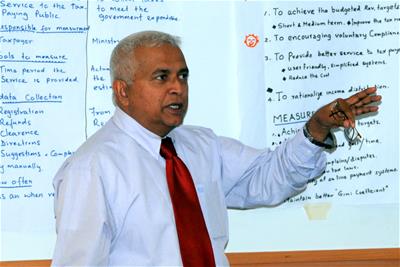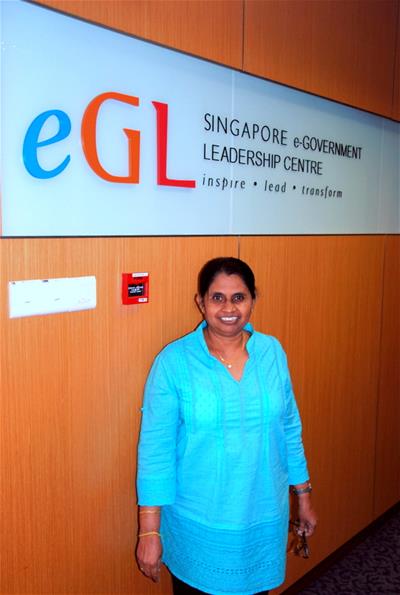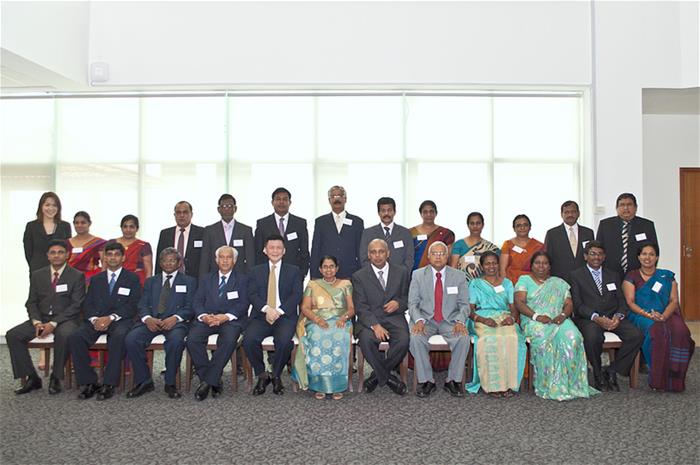Sri Lanka’s Ministry Of Finance and Planning is taking steps to transform its tax submission and collection, including getting its officers skilled to take on the momentous transformation.
It has engaged the Singapore e-Government Leadership Centre (eGL) to equip 176 of its senior officials with the IT knowledge and skillset to undertake this transformation journey.
Ashok Kumar, Programme Director of this training programme at eGL, explained that after assessing the needs of the ministry, a training programme on e-governance and change management was customised and will be conducted over several classes in eGL, Singapore.
He said, “The programme will cover key areas such as the management of e-governance projects, business process re-engineering, change management, innovation enterprise architecture and fiscal policy and reform concepts.
“As part of the customisation, we contextualised all our material to ensure its relevance to Sri Lanka and its tax domain by featuring relevant Singapore experiences. In addition we also had key personnel from Singapore’s equivalent government bodies coming in to share their experiences. This is to ensure that the curriculum content is rich with concepts, tools, techniques, frameworks and hands-on experiences, so as to deliver quality and value. By the end of the class, our clients are equipped with the essential skills and knowledge to lead and direct the transformation initiative.”
The first class held in late February was attended by senior civil servants including the Director General of the Department of Information Technology Management, Mr P.A. Dias.

Mr P.A. Dias, Director General of the Department of Information Technology Management, Sri Lanka
Mr Dias remarked, “It is a very good course. It is planned well, with theory in the morning and case studies in the evening. This morning, for example, we had theory on project management and in the evening we will be having Mdm Chew Tiew San, Senior Project Director from the Inland Revenue Authority of Singapore, to tell us how she managed an automation project. This way, theory is made clearer by real-life experience.”
Mr Dias said the course would greatly influence how he would run his newly set-up department. “Take for example this morning’s lecture on how to employ users’ requirements to shape software design. Moving forward, this will be a big part of how we do things within the department. We will be applying users’ feedback and ideas in our design projects.”
He added, “My biggest takeaway from the course, however, is that proper planning is vital whenever you introduce a new system.
“Our Department of Inland Revenue is a little behind in automation, which affects revenue collection and makes tax submission inconvenient for our citizens. Information is also manually collected. This makes it hard to formulate policies.”
Mr Dias is upbeat about the prospects of his ministry’s computerisation. “With this course, we are confident that automation can be achieved in the Ministry of Finance and Planning. Now my team knows at least what to do and how to do it, especially regarding certain aspects of change management like conducting awareness courses and informing the staff.”
Mrs. M. Samarasekara, the Commissioner General of the Department of Inland Revenue, who participated in the first class, was equally impressed.

Mrs. M. Samarasekara, Commissioner General of the Department of Inland Revenue, Sri Lanka
“This course will benefit my department and government because it meets precisely our needs today in terms of what is required to be done by all levels in an organisation from the high level to the middle and lower levels. We have to launch our automation project this year and this course will help us prepare for it; how to manage the launch, what aspects to include, and what to watch out for by way of possible causes of failure.”
In addition, the course will shape the general operations in her department, revealed Mrs Samarasekara. “The lesson on enterprise architecture was an eye-opener. We learnt how enterprise architecture (i.e. the master planning of business and IT) was important for the tax system of the Inland Revenue Authority of Singapore, ensuring that development and subsequent changes were efficiently handled. We will be using the knowledge gained on enterprise architecture and other topics for the automation of our department.”

eGL helps Sri Lanka’s Ministry Of Finance and Planning to equip its senior officials with IT knowledge and skillset starting with their first class in February 2013.